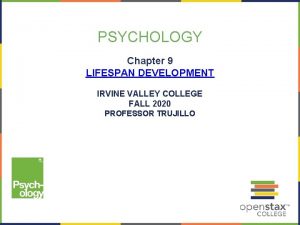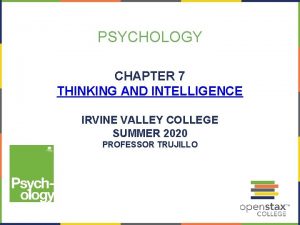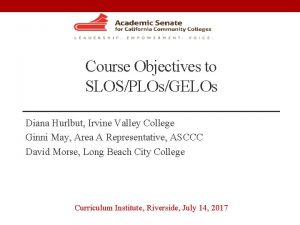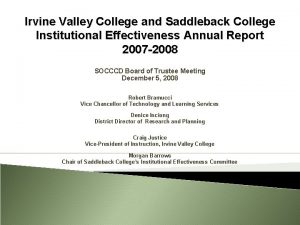PSYCHOLOGY CHAPTER 1 INTRODUCTION TO PSYCHOLOGY IRVINE VALLEY


























- Slides: 26

PSYCHOLOGY CHAPTER 1 INTRODUCTION TO PSYCHOLOGY IRVINE VALLEY COLLEGE SUMMER 2020 PROFESSOR TRUJILLO

FIGURE 1. 1 Psychology is a social science discipline. Psychology is the scientific study of mind and behavior.

FIGURE 1. 2 Antonio Canova's sculpture depicts Eros and Psyche –means soul in Greek The root ology – study of

THE SCIENTIFIC METHOD The Scientific Method is the basis of scientific study. The process starts with a Research Question about how or why something happens, a Hypothesis or tentative statement to explain the phenomenon. For a Scientific Explanation to be testable, it must also be perceivable and measurable

THE SCIENTIFIC METHOD A Scientific Theory broad explanation or group of explanations for some aspect of the natural world that is consistently supported by evidence over time For instance, after numerous hypotheses were developed by Charles Darwin, they were collected together into a theory. It is the best understanding that we have of that part of the natural world. An Empirical Method of study is based on observation, including experimentation.

INTROSPECTION Psychology accepted as an academic discipline in the 1800 s Wilhelm Wundt was the first person referred to as a psychologist Structuralism is the study of the elements of consciousness. The idea is that conscious experience can be broken down into basic conscious elements, much as a physical phenomenon can be viewed as consisting of chemical structures, that can in turn be broken down into basic elements. Wilhelm Wundt is credited as one of the founders of psychology. He created the first laboratory for psychological research This photo shows him seated and surrounded by fellow researchers and equipment in his laboratory in Germany.

INTROSPECTION Psychology accepted as an academic discipline in the 1800 s Wilhelm Wundt was the first person referred to as a psychologist Introspection refers to a process by which someone examines another person’s consciousness as objectively as possible Wilhelm Wundt is credited as one of the founders of psychology. He created the first laboratory for psychological research This photo shows him seated and surrounded by fellow researchers and equipment in his laboratory in Germany.

FUNCTIONALISM William James was the first American psychologist. Wrote The Principles of Psychology (1890). Functionalism: the purpose of psychology was to study the function of behavior. It is the study of the operation of the whole mind rather than the individual parts.

PSYCHOANALYTIC THEORY Psychoanalytic theory focuses on a person’s unconscious and early childhood experiences. (a) Sigmund Freud was a highly influential figure in the history of psychology. (b) One of his many books, A General Introduction to Psychoanalysis, shared his ideas about psychoanalytical therapy; it was published in 1922.

BEHAVIORISM John B. Watson is known as the father of Behaviorism within psychology. Behaviorism is the study of observable behavior and focus on behavior control. Behaviorists study Learned Behavior

BEHAVIORISM B. F. Skinner Developed s system of rewards and punishments. A Skinner box is a chamber that isolates the subject from the external environment. (a) B. F. Skinner is famous for his research on operant conditioning. (b) Modified versions of the operant conditioning chamber, or Skinner box, are still widely used in research settings today. (credit a: modification of work by "Silly rabbit"/Wikimedia Commons)

HUMANISM Humanism is a perspective within psychology that emphasizes the potential for good that is innate to all humans. Carl Rogers, shown in this portrait, developed a Client -centered Therapy method that has been influential in clinical settings

HUMANISM Abraham Maslow, developed Maslow's Hierarchy of Needs Proposed a hierarchy of human needs in motivating behavior

PINNACLES OF PSYCHOLOGY Naomi Weisstein Started the feminist revolution in psychology Francis Cecil Sumner First African American to receive a Ph. D in psychology in the United States

COGNITIVE REVOLUTION From the Cognitive Revolution emerges the interdisciplinary field of Cognitive Psychology which studies mental processes and its relation to behavior. Cognitive science uses concepts from psychology, anthropology, linguistics, computer science and neuroscience. Noam Chomsky was very influential in beginning the cognitive revolution. In 2010, this mural honoring him was put up in Philadelphia, Pennsylvania. (credit: Robert Moran)

BIOLOGICAL PSYCHOLOGY Biological Psychologists study how the structure and function of the nervous system generate behavior.

SENSATION AND PERCEPTION Sensation and Perception: When you look at this image, you may see a duck or a rabbit. The sensory information remains the same, but your perception can vary dramatically.

DEVELOPMENTAL PSYCHOLOGY Jean Piaget is famous for his theories regarding changes in cognitive ability that occur as we move from infancy to adulthood. Developmental Psychology is the study of development across a lifespan.

PERSONALITY FIGURE 1. 14 Personality- focuses on thoughts and behaviors than make each individual unique Big Five: Each of the dimensions of the Five Factor Model is shown in this figure. The provided description would describe someone who scored highly on that given dimension. Someone with a lower score on a given dimension could be described in opposite terms. OCEAN

SOCIAL PSYCHOLOGY Social Psychology Focuses on how we interact and relate to each other. Stanley Milgram’s “Shock Experiment” demonstrated just how far people will go in obeying orders from an authority figure. This advertisement was used to recruit subjects for his research. In this seminal experiment, 2/3 of participants complied to give potential deadly electric shocks to ‘learners’.

INDUSTRIAL-ORGANIZATIONAL PSYCHOLOGY Industrial-Organizational Psychology applies psychological theories, principles, and research findings in industrial and organizational settings.

HEALTH PSYCHOLOGY Health psychology focuses on how health is affected by the interaction between biological, psychological, and social factors. The biopsychosocial model suggests that health/illness is determined by an interaction of these three factors.

TREATMENTS Clinical Psychology focuses on diagnosis and treatment of psychological disorders and other behavior-based problems Cognitive-behavioral therapists take cognitive processes and behaviors into account when providing psychotherapy. This is one of several strategies that may be used by practicing clinical psychologists.

CAREERS IN PSYCHOLOGY Doctoral degrees are generally conferred in formal ceremonies involving special attire and rites. The Doctor of Philosophy in Psychology degree (Ph. D), can prepare students for clinical settings, however, the emphasis is on research and less on clinical practice. The Doctor of Psychology degree (Psy. D) prepares students to practice psychology in a wide range of clinical settings. A Psy. D focuses more on clinical practice and less on research. (credit: Public Affairs Office Fort Wainwright)

CAREERS IN PSYCHOLOGY Individuals earning a Ph. D in psychology have a range of employment options.

JOB OUTLOOK According to the Bureau of Labor Statistics, overall employment of psychologists is projected to grow 14% from 2016 to 2026, faster than the average for all occupations. Employment growth will vary by occupation.
 Irvine valley memories
Irvine valley memories Irvine valley water district
Irvine valley water district Transfer center ivc
Transfer center ivc Uci post bacc
Uci post bacc Exposure therapy irvine
Exposure therapy irvine Exposure therapy irvine
Exposure therapy irvine Diathesis stress model
Diathesis stress model Irvine swim league
Irvine swim league Michelson water reclamation plant
Michelson water reclamation plant Ics building uci
Ics building uci Webreg
Webreg Tilly bailey & irvine llp
Tilly bailey & irvine llp Irvine ranch water district
Irvine ranch water district Irvine animal care center
Irvine animal care center 136ba isotope
136ba isotope Quien es doreen irvine
Quien es doreen irvine Doreen irving halloween
Doreen irving halloween Quien fue doreen irving
Quien fue doreen irving Quien fue doreen irvine
Quien fue doreen irvine Writing 37 uci
Writing 37 uci Nadams2012
Nadams2012 Ics irvine
Ics irvine Acpworkbench
Acpworkbench Irnl
Irnl Efc irvine
Efc irvine Active ride shop san diego
Active ride shop san diego Webreg uci
Webreg uci













































